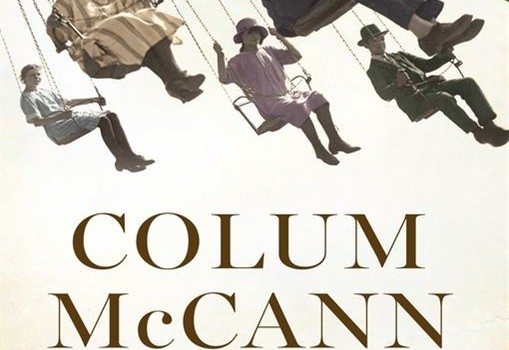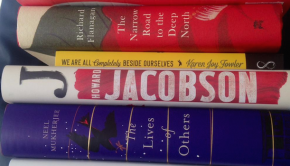TransAtlantic by Colum McCann
| Press reviews | Buy the book | Have your say |
Blurb: 1919. Emily Ehrlich watches as two young airmen, Alcock and Brown, emerge from the carnage of the First World War to pilot the very first non-stop transatlantic flight from Newfoundland to the west of Ireland. Among the letters being carried on the aircraft is one which will not be opened for almost a hundred years. 1998. Senator George Mitchell criss-crosses the ocean in search of an elusive Irish peace. How many more bereaved mothers and grandmothers must he meet before an agreement can be reached? 1845. Frederick Douglass, a black American slave, lands in Ireland to champion ideas of democracy and freedom, only to find a famine unfurling at his feet. On his travels he inspires a young maid to go to New York to embrace a free world, but the land does not always fulfill its promises for her. From the violent battlefields of the Civil War to the ice lakes of northern Missouri, it is her youngest daughter Emily who eventually finds her way back to Ireland. (Bloomsbury)
Charlotte Heathcote, The Daily Express
“While McCann converts history into fiction with aplomb, he seems more comfortable with the freedom of straight fiction. In a recent interview he has described using a plot in fiction as “vaguely juvenile”, but this juvenile reader preferred the chapters that teamed storytelling with powerful writing over those that were more of an exercise in linguistic flair.”
Freya Johnston, The Telegraph
“There is a risk that historical fiction, organised as it is here, will end up as a gallery of unrelated snapshots from the past. Just when you start to think that this novel is no more than a collection of disparate tales, book two shows you how they are interlocked. It seems fitting that the author also sends us back to the start. The zigzag chronology, as it turns out, was designed to make us think about how we remember and how we change. TransAtlantic makes a valiant attempt to recover the “long migratory orbits” of people and their possessions.”
Robbie Collins, The Sunday Times
“Only in the novel’s closing sequence, when McCann draws his plots together through the present-day story of a letter carried — but undelivered — by Brown on his transatlantic flight, does a sense of misty-eyed nostalgia and sentimentality creep in. But most of the novel is held remarkably together by only the most delicate of strands, through the gentle echoes resonating between the book’s diverse wandering characters.”
Erica Wagner, The New York Times
“… the final section takes us forward, to 2011, into the straitened circumstances of Hannah, Lottie’s daughter, heading toward old age herself and struggling to cope now that the Celtic Tiger has tucked its tail between its legs and fled. It’s only here, in the final chapter, that the novel shifts into the first person, and it’s hard to see exactly why it does. This section and that belonging to George Mitchell are the novel’s weakest … But a book as ambitious and wide-ranging as this is bound to be a little inconsistent, and its strengths far outweigh its weaknesses. Over and over, McCann allows the reader to see through his characters’ eyes: description serves instead of judgment.”
Ron Charles, The Washington Post
“The second part of the novel shifts registries from famous historical men to obscure fictional women. That’s a risk, of course. Can the story of the wife of an ice merchant in Grand River, Mich., compete with the remarkable history of Douglass in Ireland? Indeed. Maintaining the continuity of our interest is the essence of McCann’s talent. The women who slipped along the edges of the first three stories now emerge in their own chapters clothed in all the complexities and emotional intricacy of those famous men.”
Sue Norris, The Financial Times
“Brown carries a letter handed to him by Lottie, the young woman who, with her mother Emily Ehrlich, watched the take-off. These women and their descendants come to the fore later in the book. In Dublin, Douglass notices a housemaid, Lily, who is inspired to make his passage in reverse. Her voyage to the US, where she becomes Lily Ehrlich – and Emily’s mother – is as epic as any. McCann is celebrating the endless human capacity to refashion the bad into something positive.”
Stuart Evers, The Independent
“Among these events we see the changed world through the experiences of four generations of women – Lily Duggan, Emily Ehrlich, Lottie Tuttle, Hannah Carson – though it is not always clear why the incidents we are witnessing are important to them. In each case these are unconventional characters; bold and striking. They emerge as fully hewn, full-blooded creations … TransAtlantic is, however, sometimes hidebound by missteps and false notes. The opening chapter reels off all the clichés of historical fiction … The one-sentence paragraphs that strive for profundity too often sound hollow. But these seem mealy-mouthed criticisms when you consider the book as whole, as a tapestry of lives and history, beautifully constructed.”
Michiko Kakutani, The New York Times
“Mr. McCann has an annoying habit here of embroidering his prose. He writes about skies becoming “a candelabra of violence” during the war; of New York appearing to immigrants arriving by ship like “a cough of blood” on the horizon, with the sun going down behind the buildings; of a woman sliding “like a seal, out of any old sadness she carried” when she hears of the Good Friday peace agreement. Such pretty, creative-writing-class flourishes are unnecessary and distracting — they pull the reader’s attention away from the real achievement of this novel: its deeply moving portrait of Lily and her descendants, whose stories of hope and survival are played out against the vast, backlit diorama of a century and a half of Irish-American history.”
Mark O’Connell, The Observer
“The book is vast in scope, but not in length – it clocks in at fewer than 300 pages – and so there’s a fair amount of negative space in play here. We are given interludes, aftermaths, climaxes without buildups. TransAtlantic, in this sense, is a sort of epic in graceful shorthand … At its best, as in the superbly rendered early scene of Alcock and Brown’s flight, the prose is poetically vivid. Often, though, it’s clear that McCann is the type of novelist who is uncomfortable writing a sentence that couldn’t be removed from its context and still be identified as literature.”
Theo Tait, The Guardian
“In order to incorporate all its stories, the plot becomes a little contorted, its themes generalised: war versus peace, tolerance versus prejudice. The prevailing tone is, as a result, a bit official, sententious and uplifting, redolent of an extended St Patrick’s Day speech by a gifted American politician.”
Buy the book
Amazon | Foyles | Hive | Waterstones
[AMAZONPRODUCT=1408829371]
OMNISCORE:












